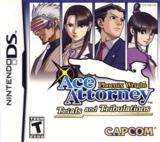A fitting 'career end' for P. Wright, TnT lacks some innovation from the first game but humour and script is stand-
While the game takes place after the second game, it does flashback to before the first game when Mia Fey was still alive - a perfect opportunity to tell more about her past in respect to the Fey heritage. Actually, the entire game revolves around the Fey family; the chapters answer questions regarding the Fey traditions, family bonds, the spirit channeling powers while also pulling in a mysterious prosecutor who turns out to be so relevant to the livelihoods of the main characters. If you're new to the Phoenix Wright franchise, then this isn't really the best place to start. The game can be played by new players but the bulk of the enjoyment comes from the humour and development of the beloved characters from start to finish. For those who've played the previous games, the game almost looks identical to the previous games. While animation is excellent, a lot of it is recycled. The exceptions come about with new characters, each with their own movements and music themes. The familiar music and sound effects are also heavily recycled, although they do do a great job - you have to be wearing earphones to appreciate the audio. As always, you can shout into the microphone for raising objections or pressing the witnesses - if you can brave the outburst in front of others. So if the gameplay is exactly the same and that even a lot of the animations and sounds are recycled, what is it that makes this game a stand-out title? While the game still does not feature those small puzzles I liked from the first game, the script is just so good to the point that it makes those small details forgivable. Trials and Tribulations tie up the loose ends from both the first and second game and enriches the history of some familiar characters. In this respect, the game oozes fan-service of the best kind - you even control Miles Edgeworth (both friend and adversary in the first game) at one point. The other negative to point out is that sometimes it's not entirely obvious when to present evidence while fully knowing the contradictions behind it - the game can be picky and this sort of ups the difficulty. To say it in other words, you do know the contradiction in the testimony but you might eventually resort to a guide to progress because it was that specific part of the testimony with that specific evidence.
After completing the game and reflecting on my experience, I'd have to say that the creation of the series is masterful. People argue whether video games are not just mere entertainment, that they are not mere toys and that they are also an art form. My personal opinion on the matter is that videogames are a business, yet it can bring forth entertainment AND art to the player. Are videogames at the same level as movies? No, in fact, I think it's higher - or at least, have the potential to be much higher. A movie may impact a viewer emotionally through a story but the movie will still be limited by the natural disconnect of viewer and footage. A videogame can tell the exact same story through the exact same footage - the difference however, is that the viewer can be affected in a much more substantial way due to interaction. Simply due to interaction, a story/experience is capable of changing in a way that will grow the bond between videogame and player. What has this to do with Phoenix Wright? Well, I mentioned that videogames have the 'potential' to be on a higher plane than movies; Phoenix Wright achieves that level of storytelling at least as good as movies and novels, and it does so with so much enthusiasm through the animations of the characters. If someone were to compare scripts between the mediums, Phoenix Wright or Ace Attorney is a fitting profile to use. The series stands out in my mind simply for achieving that level in this still-growing industry. Well, enough about that, lets finish up this review - To sum up Trials and Tribulations, this is almost on par in being as good as the first game. This is a must buy for fans of the series, and although new players can get into it starting from this game, I highly recommend them not to. The nature of how you connect with the characters like a good novel lends itself to be best experienced from beginning to end - like the beginning to end of Phoenix Wright's career as an attorney at law. Fittingly put, this 3rd game in the series is actually a sort of finale because the next game from Capcom is called Apollo Justice, the name of the new protagonist in a much younger generation. I'm not sad about it that much because this 3rd outing was scripted so well, the sense of closure was there.

